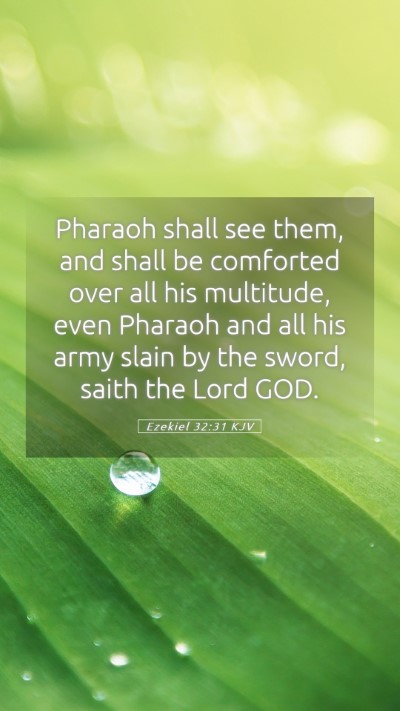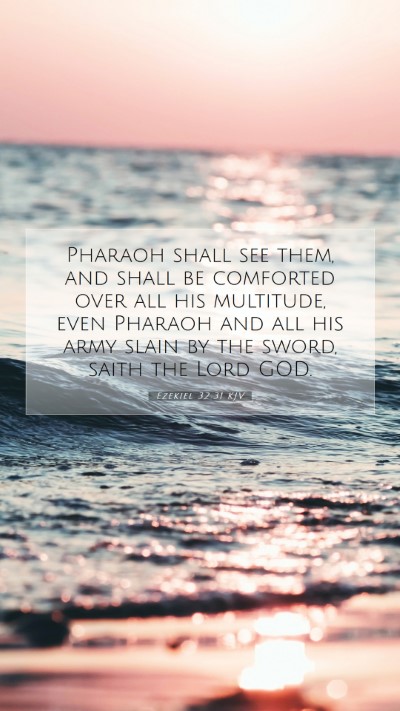Bible Verse Meaning and Commentary on Ezekiel 32:31
Verse: Ezekiel 32:31 states, "Pharaoh shall see them, and shall be comforted over all his multitude, even Pharaoh and all his army slain by the sword, saith the Lord God."
This verse is a prophetic proclamation by the Prophet Ezekiel regarding the fate of Pharaoh and Egypt. It reflects on a day of reckoning, illustrating profound themes of judgment and the inevitability of divine justice.
Insights from Public Domain Commentaries
Matthew Henry Commentary
Matthew Henry emphasizes that Ezekiel's prophecy targets the expectant glory of Egypt, showcasing God’s power over nations. Pharaoh, once so powerful, will find himself in a position of acknowledgment as he witnesses the destruction of his army. This serves both as a humbling reminder of human frailty before God’s might and as an encouragement to the exiled Israelites of God’s ultimate sovereignty.
Albert Barnes Commentary
Albert Barnes elucidates that the comfort mentioned in the verse is ironic; it portrays Pharaoh’s realization of his tragic destiny, where he perceives the downfall of others as a form of solace amid his own demise. Barnes notes that this indicates the pervasive nature of despair that binds the wicked—implying that even in despair, one may find some degree of comfort in the suffering of others.
Adam Clarke Commentary
Adam Clarke brings attention to the stark depiction of Pharaoh’s state after the conflict. He relates this passage to the greater themes of national pride and downfall, underscoring the illusion of security born from temporal power. Clarke posits that the sight of his fallen subjects will not urge resurrection but rather a deepened recognition of his impotence against God’s decree.
Overall Themes and Interpretations
The interpretations of Ezekiel 32:31 converge on several central themes:
- Divine Judgment: The verse encapsulates God’s judgment, reinforcing the notion that no earthly power can withstand divine will.
- Humility Before God: It challenges readers to remember the limits of human authority and the ultimate reality of God’s control.
- Irony of Comfort: The idea that Pharaoh finds some comfort in the downfall of others highlights a perverse perspective inherent in those who oppose God.
- Hope for the Exiled: For the exiled Israelites, this prophecy serves as a beacon of hope, assuring them that their enemies will face the consequences of their actions.
Applications and Reflections
Understanding Ezekiel 32:31 calls for reflection on how individuals view power and authority in their own lives. It invites readers to:
- Examine their perspectives on success and downfall.
- Consider the eternal implications of their actions and align them with divine will.
- Recognize the stories of judgment in Scripture as instructive for personal faith and community morality.
Cross References
- Isaiah 14:15: Talks about the fall of the Babylonian king, drawing parallels to Egypt’s eventual downfall.
- Ezekiel 30:4: Details the sword against Egypt, establishing the context for God’s judgment.
- Revelation 18:9-10: Discusses the lament of nations over fallen Babylon, echoing themes of loss and acknowledgment of God’s sovereignty.
Conclusion
Ezekiel 32:31 presents rich layers of meaning relevant to biblical studies. It serves as a compelling narrative of judgment, an exhortation for humility, and encouragement for hope in God's ultimate justice. For those engaged in Bible study discussions, this verse offers fertile ground for exploring themes of morality, responsibility, and community among believers.


